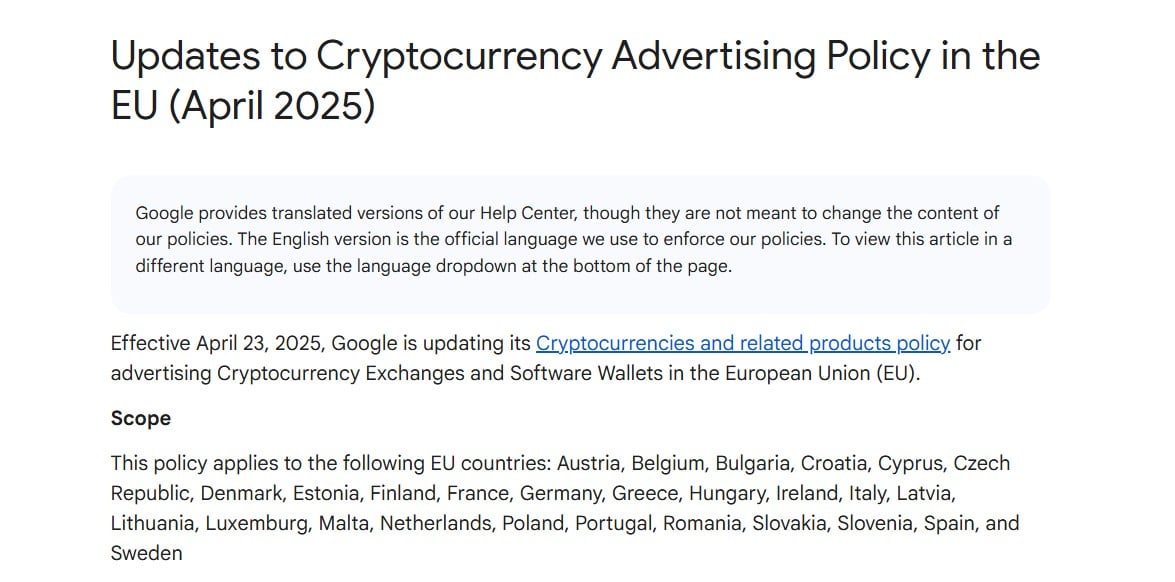It is a truth universally acknowledged that a tech giant in possession of a vast advertising empire must be in want of stricter regulations. Thus, Google, in its infinite wisdom, has decreed that from the 23rd of April 2025, only those crypto firms graced with the coveted MiCA license shall be permitted to advertise their wares within the European Union. 🎩✨
Advertisers, it seems, must now possess not only a MiCA license but also the blessing of Google’s certification to peddle their digital treasures across the EU. One cannot help but marvel at the audacity of such a scheme, which promises to elevate compliance standards while simultaneously vexing smaller firms and those clinging to their antiquated national licenses. 😏
This regulatory shift, while undoubtedly noble in its intent to protect the unsuspecting masses from the perils of unregulated crypto, has also raised the stakes for those seeking to engage with the EU’s discerning users. For crypto marketers, it appears that compliance is now the price of visibility in one of the world’s most heavily regulated markets. A most vexing predicament, indeed. 💼

This move, while ostensibly aimed at fostering regulatory uniformity across the bloc, has also introduced a new layer of complexity for advertisers. The EU’s Markets in Crypto-Assets (MiCA) regulation, the first of its kind, seeks to standardize rules across the region, leaving no room for ambiguity or improvisation. Advertisers must now register as Crypto-Asset Service Providers (CASPs) and navigate the labyrinthine requirements of local laws, all while securing Google’s imprimatur. A Herculean task, to be sure. 🏛️
For those in Finland, France, and Germany, there is a brief reprieve, as country-based licenses remain valid during the transition periods. However, the clock is ticking, and the deadlines loom large: the 30th of June 2025 for Finland, the 30th of June 2026 for France, and the 30th of December 2025 for Germany. After these dates, MiCA licenses shall become mandatory, and woe betide those who fail to comply. ⏳
Non-compliant advertisers, it must be noted, shall not face immediate suspension. Instead, Google, in its magnanimity, shall issue at least a 7-day warning before taking enforcement actions. A small mercy, perhaps, but one that offers little solace to those scrambling to meet the new requirements. 🚨
In the grand scheme of things, Google’s alignment with MiCA may well set a precedent for other tech platforms and regions, leading to stricter global ad regulations. A most intriguing development, and one that shall undoubtedly keep crypto marketers on their toes for the foreseeable future. 🌍
Thus, dear reader, we find ourselves at the dawn of a new era in crypto advertising, where compliance is king, and the stakes have never been higher. One can only hope that the industry shall rise to the occasion, lest it be consigned to the annals of history as a cautionary tale of ambition thwarted by regulation. 📜
Read More
- Clash Royale Best Boss Bandit Champion decks
- Vampire’s Fall 2 redeem codes and how to use them (June 2025)
- Mobile Legends January 2026 Leaks: Upcoming new skins, heroes, events and more
- World Eternal Online promo codes and how to use them (September 2025)
- How to find the Roaming Oak Tree in Heartopia
- Clash Royale Season 79 “Fire and Ice” January 2026 Update and Balance Changes
- Clash Royale Furnace Evolution best decks guide
- Best Arena 9 Decks in Clast Royale
- FC Mobile 26: EA opens voting for its official Team of the Year (TOTY)
- Best Hero Card Decks in Clash Royale
2025-04-15 19:05